War between China and the United States would end our civilisation as we know it. In the face of such risk, it may appear sound for all sides to declare their intentions to descalate the Taiwan Strait. Peter Harris and Jared M. McKinney argue that this is mistaken and dangerous: strategic clarity lacks credibility, is unlikely to work, and could set off a third world war.
China’s military drills in May, which surrounded Taiwan in a manner reminiscent of China’s “exercises” in 2022 after Nancy Pelosi’s visit to Taiwan, once again raised the prospect that sometime in the not-too-distant future China’s “drills” might become the real thing. A Chinese invasion of Taiwan would be even harder to contain than Russia’s war in Ukraine or the conflict in Gaza. It might even be the spark that sets off World War III.
In Washington, the conversation is understandably focused on how the United States can best deter war in the Taiwan Strait. To those who regard Taiwan as the ultimate domino, one suggestion stands head and shoulders above the others: the idea that the United States must provide “strategic clarity” that it intends to defend Taiwan in the event of a Chinese invasion.
SUGGESTED VIEWING The challenge of China With Vince Cable
This proposal—recently advanced by Matt Pottinger, a former China hand in the Trump administration, for example—draws on the old adage that the best way to secure peace is to prepare for war. There is some logic to this. If China were convinced that invading Taiwan would bring about a ruinous war with the United States, perhaps no such invasion would ever take place. But as we show in a new peer-reviewed article, there are at least five good reasons why a U.S. commitment to defend Taiwan ought not be made.
First, a U.S. commitment to strategic clarity would be what scholars of International Relations call an “incredible commitment”—that is, a promise that others have good reason to doubt. Such commitments cannot by themselves be considered robust deterrents.
It is worth emphasizing that President Biden has already said that he would defend Taiwan, yet his repeated insistences have not been taken as evidence that strategic clarity already exists. Why not? The reason is that, in world politics, talk is often seen as cheap. Simply saying that the United States would defend Taiwan is not nearly enough to establish a credible deterrent.
For strategic clarity to have more of a deterrent effect, the United States would have to put its money—not to mention the lives of its Soldiers, Sailors, and Airmen—where its mouth is. In other words, it would have to take material steps to assure Beijing that when they say America will defend Taiwan, this constitutes a pledge that will be fully followed through on.
This is easier said than done, however, which constitutes the second reason for why strategic clarity would be hard to achieve in practice. Of course, Washington is no stranger to making its security commitments to other allies—Japan, South Korea, the Philippines, and NATO countries, for example—seem credible in the eyes of its adversaries. But in the case of Taiwan, the usual mechanisms for bolstering the credibility of “extended deterrence” are not readily available.
Most obviously, there is no chance of signing a mutual defense agreement with Taipei because the United States already agreed to end such a relationship with Taiwan in the 1970s in exchange for diplomatic recognition and strategic cooperation with Beijing. Indeed, the United States does not even recognize Taiwan as a sovereign nation capable of concluding binding defensive pacts.






















Join the conversation